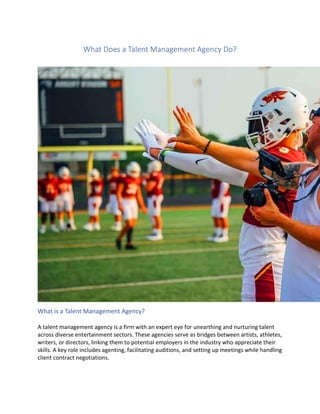A Biased View of The Casting Connection
A Biased View of The Casting Connection
Blog Article
What Does The Casting Connection Do?
Table of ContentsThe Best Guide To The Casting ConnectionThe smart Trick of The Casting Connection That Nobody is Talking AboutUnknown Facts About The Casting ConnectionThe Greatest Guide To The Casting ConnectionThe smart Trick of The Casting Connection That Nobody is Talking About
An ability representative serves as a representative for artists, performers, professional athletes, and other people in the entertainment sector. Their main duty is to advertise and represent their customers' rate of interests, helping them secure chances such as acting roles, modeling gigs, recommendations, music contracts, or sporting activities offers. Talent scout function closely with their customers to understand their career goals and ambitions, and then leverage their sector connections and competence to bargain contracts, protected tryouts, and discover various avenues for direct exposure and success.Talent scout typically operate in busy and dynamic environments that focus on the entertainment market. Their workplaces can differ based on the size and sort of company they are employed in. Below are some usual elements of the workplace of a talent scout: Ability Agencies: Many talent representatives operate in talent companies, which can range from tiny store firms to big, reputable companies.

The Casting Connection Fundamentals Explained
These conferences can happen in the firm's workplace, at client events, or at external places practical for the client. Auditions and Casting Calls: Representatives may accompany their customers to auditions and casting calls, offering assistance and assistance throughout the procedure. This could involve taking a trip to different areas, such as production workshops, casting offices, or movie collections.
These settlements typically take place using phone or email, with representatives working vigilantly to safeguard beneficial terms for their clients. Study and Market Updates: Representatives remain notified about sector fads, casting telephone calls, and market demands. They perform research study on prospective clients, tasks, and market advancements to offer beneficial insights to their clients.
They utilize email, phone calls, video conferencing, and specialized software to remain in touch with customers and market contacts. https://www.goodreads.com/user/show/180928186-jeremiah-smith. High Pressure and Lengthy Hours: The amusement sector operates limited schedules and target dates - Sheet music and score online resource service. Skill representatives commonly function long hours, including nights and weekend breaks, to ensure they are readily available to react to opportunities and customer needs immediately
They should be strategic and persuasive to secure the most effective deals for their clients, whether it's for a function in a film, a modeling agreement, or a music offer.
A Biased View of The Casting Connection
Once you know the distinction, it comes to be really clear. Lots of people new to the acting company, and even more of those outside of it don't know the distinction. In a few words: Basically, a skill representative is worked with by the actor to stand for the actor. The actor's representative watches out for skill's interests, dealing with their part (the extremely interpretation of "agent").
They are employed by the manufacturer or the end-client, and their loyalty is to that side of the manufacturing chain. In the service of product advertising and marketing and marketing interactions, there are all kinds of representatives.

And yet, although the talent scout is paid by talent (generally via compensation), they must likewise please the manufacturer to do their job successfully. Casting Representative: Hardly ever in major markets, but sometimes in smaller sized markets, check it out some talent scout play both duties, at the very least functionally. They stand for the skill (normally being paid by payment), however they may likewise conduct tryouts themselves.
The Only Guide to The Casting Connection

Ad agency: This company stands for the "marketer," which is the firm that creates or markets the service or product being sold. http://go.bubbl.us/e3d8bf/4a0c?/The-Casting-Connection. With the blooming of media types over recent decades, an ad company might develop any kind of type of advertising interaction or audio item, varying from a radio commercial to a viral web video clip
These, and representatives by various other names are similar to the ad agency, because they offer the marketer, in numerous means. Their service may be wider (e.g., an advertising agency could do anything that is marketing-related), or may be a lot more details (e. Theatre Database Online Services.g., a media company recommends and/or buys media time and space)
Rumored Buzz on The Casting Connection
Talent Scout. It refers to looking for out interesting (and hopefully qualified) talent, instead than going out through the standard casting chain and having actually chosen choices come back.
From a client/producer's viewpoint, scouting for talent is a genuine method, yet most likely not their only strategy. It's inherently inefficient and unforeseeable; the talent may have some distinctive high quality, yet be inexperienced, undirectable and/or unreliable, and undoubtedly, the start of a tight production routine is not the moment to begin searching for diamonds in the rough.
Report this page